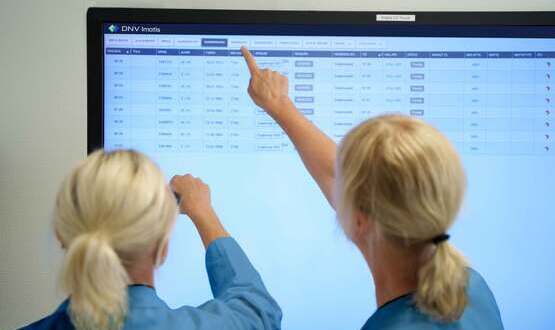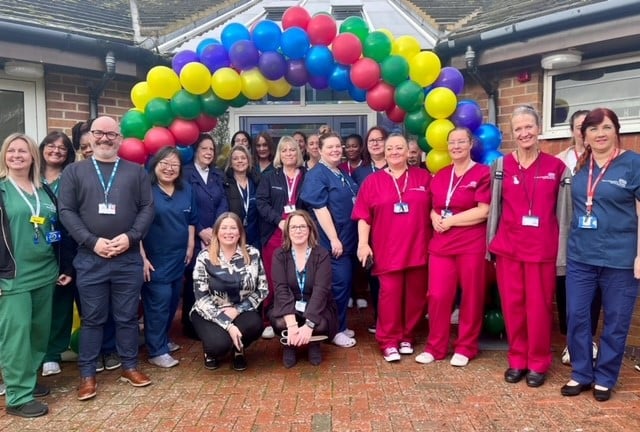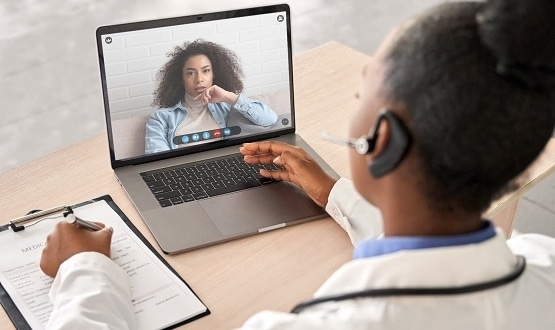Leeds council develops Person Held Record for locals
- 5 October 2017

Leeds residents will soon be able to better manage their health online following the development of an open platform-based Person Held Record.
The £1.8 million Leeds PHR programme will kick off next year, developed in 12-month blocks, as part of an initial three-year pilot led by Leeds City Council in partnership with NHS organisations across the city.
The technology will be built on an open-source platform for the health and care sector, developed in Leeds by the Ripple Foundation. It is hoped to build up to 1400 users during the three-year project.
A Ripple Foundation spokesman said the PHR project is about empowering citizens, supporting towards more proactive care, self-management to help towards alleviating pressures felt at the front line.
The start of the city-wide PHR project follows extensive engagement with individuals, care professionals and stakeholders across Leeds to understand their needs and aspirations.
“Phase one will enable people to register, verify their identity and log into their PHR. It will let people contribute and update information about themselves, for example, a top three things to know about me”, the spokesman said. “It will also integrate with the Leeds Care Record that is widely used by care professionals across the city.”
Leeds is the UK’s third largest city, after London and Birmingham, with a diverse population of more than 770,000 people. Leeds councillor and chair of the Leeds Health and Wellbeing Board, Rebecca Charlwood said: “We need to nurture a health and care system where people have more conversations and opportunities to help unlock the best solutions for them.”

“The Person Held Record programme is a key enabler of this work”, Charlwood said.
Leeds Council chief digital and information officer Dylan Roberts said they will continue to work closely with locals, care professionals and national organisations to ensure any technology built and implemented can be reused across the nation.
“We do it in a way that’s simplified, standardised and shared”, Roberts said.
Roberts said a big challenge is encouraging a marketplace to create capabilities on top of the PHR.
He hopes the market will help create apps and functionality that will work with the open platform because they conform to the standards set. For example, if a patient has a chronic long-term condition, they will be able to personalise their PHR with this information.
According to Dr Tony Shannon, director at Ripple Foundation, the health and care system is suffering from an underperforming health IT sector which makes it harder for care professionals to work with their patients efficiently and effectively.
“By building their PHR on an open platform, in line with the international open electronic health record (openEHR) standard, Leeds has embarked on a transformational move to future-proof its healthcare IT systems.”





20 Comments
Great to see about your progress
with harnessing IT to improve patient care in Leeds.
I continue with my WISDAM initiative
as a means to encourage everyone everywhere
to standardise the documentation in plain English
(later in any major language)
of all the basic information which each one of us
knows about ourselves
in a format which allows
both an electronic or paper version of exactly the same information
It thus remains a totally bottom upwards venture
which has a greater potential to include the ‘digitally excluded elderly”
and is totally complementary to the multiple local top down initiatives
all of which despite the ‘open source’ initiative requires us
to fill in fresh forms everywhere we go
especially if we are elderly and need to move to be nearer our children
so that
To see where I have got to with this open availability venture
do have a look at http://www.wisdam.org
I still see my approach as totally complementary to your work
Thanks to Dylan for all his hard work and to Tony for his commitment and detailed response to earlier questions.
On both a personal and professional level I really welcome this development.
As a Type 1 Diabetic, recent patient at the Durham Stroke Assessment Unit, and supporting and caring for an elderly mother-in-law with multiple comorbidities Person Held Records and/or Personal Health Records are essential elements of good health and care. I have tried to articulate the case in a blog, ‘Confused Patients – in need of .com?’ for the Patient Information Forum at: https://www.pifonline.org.uk/blog/confused-patients-can-com-help/ . Focusing on articulating the benefits from your own day to day experiences is very revealing and creates the business case.
As a NHS Educator and Digital enthusiast I’m hoping that you may be interested in the education guide that we sponsored as part of our NIB’s ‘Building a Digital Ready Workforce’ programme entitled: ‘Personal Health Records – Learning from the voices of experience’. In developing it the Patient Information Forum tried to articulate benefits, needs and concerns over PHRs from the perspectives of patients, clinicians and informaticians, see: https://www.pifonline.org.uk/learning-voices-experience-personal-health-records/ . I hope that it’s of help to you in Leeds and beyond.
Trying to view and articulate this from our own perspectives as patients first is essential if we’re going to be able to build on the existing good work at scale.
Good luck to Leeds and the Ripple Foundation and thanks for trying to help me and my family and ultimately also bring Integrated Care Records to life too.
Thanks to all those who have commented on this story, appreciate your feedback and interest.
Some of you may recall that I spent many years in Leeds, primarily as a Consultant in Emergency Medicine in the Leeds hospitals, also within NHS NPfIT and then as CCIO for Leeds Hospitals and Leeds City, until 2015. At that time we made a move to set up the Ripple Open Source Initiative, based out of Leeds City Council (since then the Ripple Foundation http://ripple.foundation/ ) to take many of the lessons learnt in Leeds (inc our work on Leeds Care Record https://www.leedscarerecord.org/ powered by the hospital’s leading PPM+ platform) and craft a related set of open source tools that could be reused anywhere.
This Person Held Record initiative by Leeds City Council highlights the thought leadership of CDIO Dylan Roberts and his team who see the potential of both a citizen facing tool to transform lives as well as an open platform stack to transform the health and care sector. In that sense this PHR push in Leeds is a unique opportunity, to work to transform and improve the lives of the people of Leeds as well as help to transform the health & care industry that needs positive disruption, so we are excited at the opportunity to help Leeds take this next step.
The PHR will provide a holistic view of your information as a citizen of Leeds and will enable people to record information that will in time feed back into the professional care record (Leeds Care Record).
The principles of user centred design, agile development, explicit consent to information sharing and working to open platform principles to be involved in this PHR programme are simply about aligning with good practice from elsewhere in the world. Of note Leeds has chosen not to procure a proprietary solution to deliver this ambition, but to work towards the internationally leading openEHR standard (inc conjunction with INTEROPen API standards) which is aimed at supporting “cradle to grave” records, shifting the market from locks with licenses towards one of useful services, with the citizen/patient playing an active part from the start of this effort.
The openEHR standard which will underpin the PHR platform in Leeds, which as an open standard, brings a technology and vendor neutral approach to proceedings, separating the system from the data. We’ve commissioned a few brief explainer videos on openEHR that should be of interest. (https://www.youtube.com/playlist?list=PLNxHSK29ViKI1foDYNUbToJuFdhwKzx4U).
The NHS in Salford hosted a very informative day on the work of the openEHR standard around the world last month and we’ll share links to that days sessions as soon as they are available.
In the fullness of time I expect the patient/citizen to be able to take more active ownership of this record, for now the aim here is built the foundations of that , a vendor & technology neutral citizen/patient record, that is part of a federated record for life, with the patient/citizen co curating with their health & care professionals.
Hope that helps clarify, please let us know if any other related questions. We will pass onto Leeds City Council or answer ourselves if we can.
Tony
Dr Tony Shannon
Director, Ripple Foundation
http://ripple.foundation/
How will PHR assist the public when they are using uncalibrated devices, which produce the data that patients will look to upload to the PHR? I’m not sure this issue has been addressed – that dependent on the device you use you could allegedly need medical advice or not (there has been some research into this). Such devices might help identify patterns but can not be assumed to be accurate. I’m not sure that’s been particularly communicated to patients.
The PHR project seems to have run away with Hunt’s desire to commericalise people’s data (have it all in one place rather than on the various apps people are using; the incentive is not just to give patients a holistic view of their health as care.data made clear to all of us).
On a separate note, why are patients in some areas able to see extracts of their health records (including integrated records) but not in others. It’s the postcode lottery again!
Phillip + Dylan – from what I understand at the technical level both projects (Leeds care record and child health) are moving towards the same standard proposed by INTEROPen. Also understand ripple is also doing this.
Agree Dylan…. we need to stop proprietary lock in and get suppliers to compete on service…… I’ll get in touch to discuss the ITT we are preparing for an open platform for the ePCHR…. Phil
Fingers crossed it will. It needs more CIOs and national leads to grow a pair and commit to open platform based approaches whether Ripple or other. Also opern platform crew to be less tech more value of heath outco.es and selling that way. (Personal opinion)
I’ve heard about the
Dylan – are you aware of the work being done within the Healthy Children Programme to create an electronic children’s health record? can we chat about how it would link in…. Phil
Amazing news that steps are being taken to provide much needed transformational healthcare services, however solutions already exist that I’m sure can achieve your 3 year goals before the end of this year, and at a fraction of the price.
I’d be happy to help.
I also believe that it will be very good if Ripple are involved. I expect that you will be able to see your secondary care record as I think the same team built that. I would be interested in the constraints that are put in place to prevent “harm” from citizens seeing anxiety provoking test results before their doctors. I think Papworth have a protocol for this they might share. Anyway, good luck. Am jealous!
Ripple didn’t build Leeds Care Record, that was primarily Leeds Teaching Trust.
I do believe this article is referring to they viewer NHS England funded or it’s something called open citizen.
Well you are probably correct but I thought Tony Shannon has a big influence on both and I thought he was heavily involved in Ripple. Anyway, hopefully they will reply for themselves. Cheers.
Ripple seem to be doing fantastic work! I’ve been watching them closely for a while and hopefully they’re creating the type of disruptive technology that we need!!
@Tor
I’m guessing it starts as a blank record that patients populate themselves. It will have a feed from the Leeds Care Record. I very much doubt info will be either uploaded or streamed into it from secondary care.
Not much point in these things if they don’t stream data from secondary care!
Careful…. DigitalHealth has a political agenda and censors those who don’t positively of these things!
Yes the intent would be that this will be your combined record from across multiple sources including data that you may capture yourself. It is hoped due to the open platform approach 3rd party applications, services or devices selected by the user could also contribute data.
So my understanding is this will allow me to view my secondary care record?
How is the consent working? I have no legitimate relationship with any care provider in Leeds except for my GP. So I presume my records aren’t being accessed or held by ripple or the council.
The Leeds PHR will be codesigned with citizens and is hoped to bring key parts of primary, secondary, community, mental health and adult social care information in from the Leeds Care Record to give citizens a more holistic view of their health and care. Citizens will also start to be able to record information in their PHR which is to be worked through as part of the pilot. This will be an explicit consent approach and information governance mechanisms will be developed to underpin this PHR Programme.
Comments are closed.